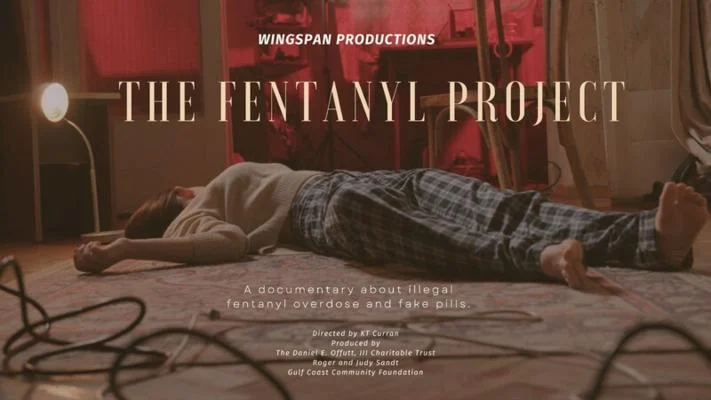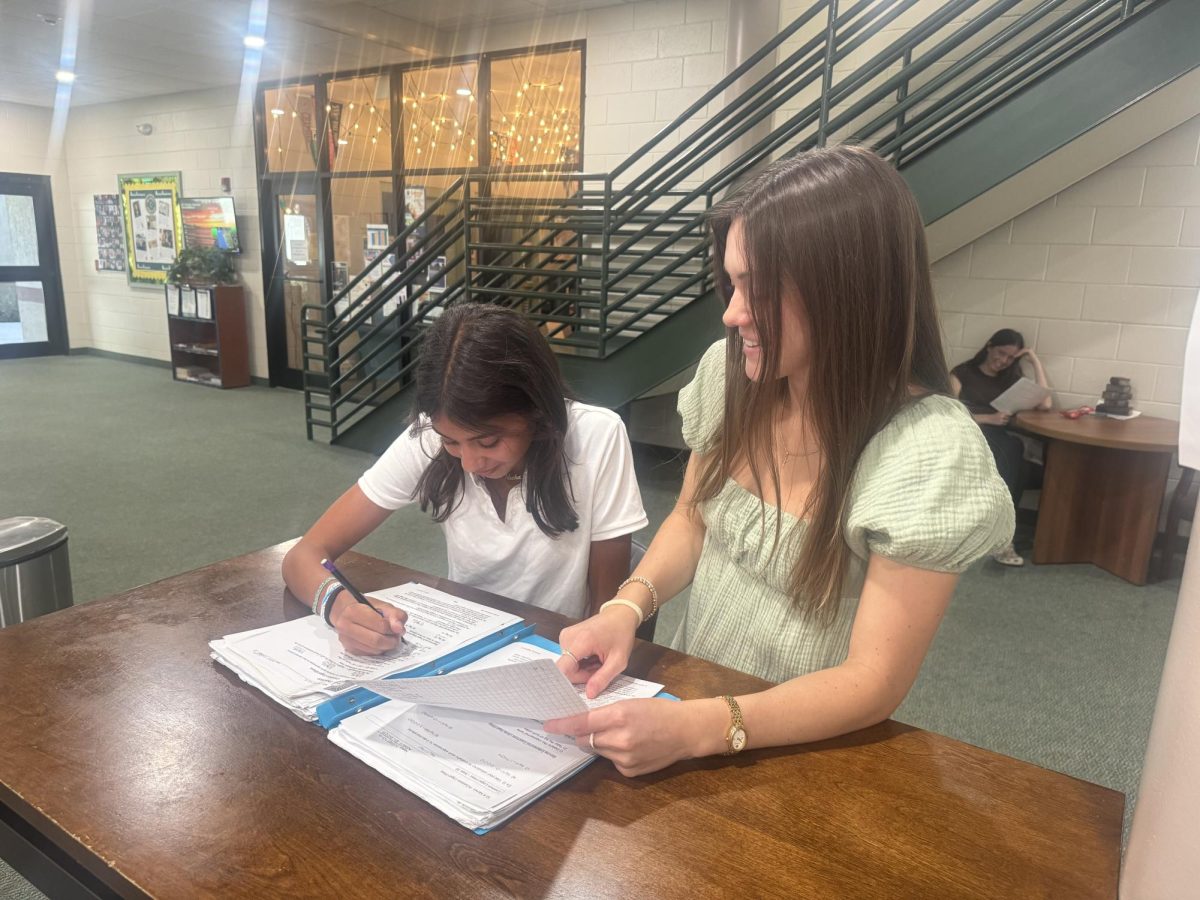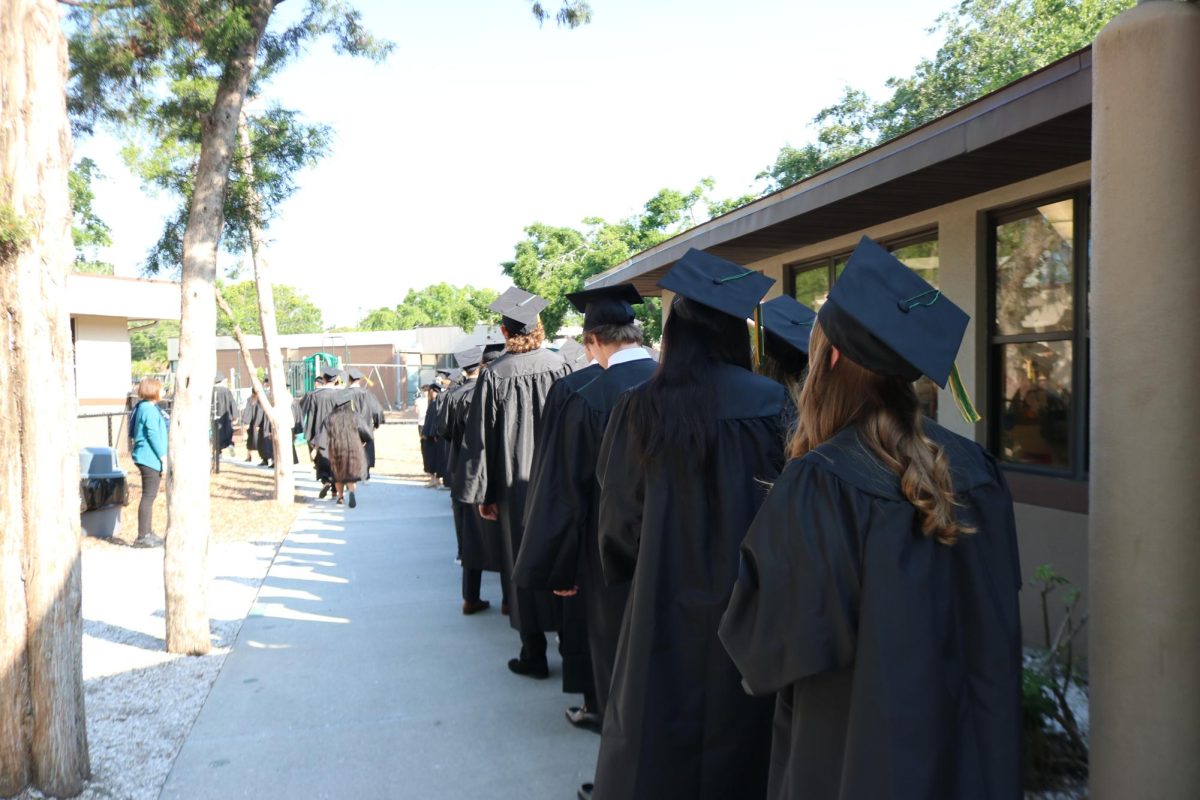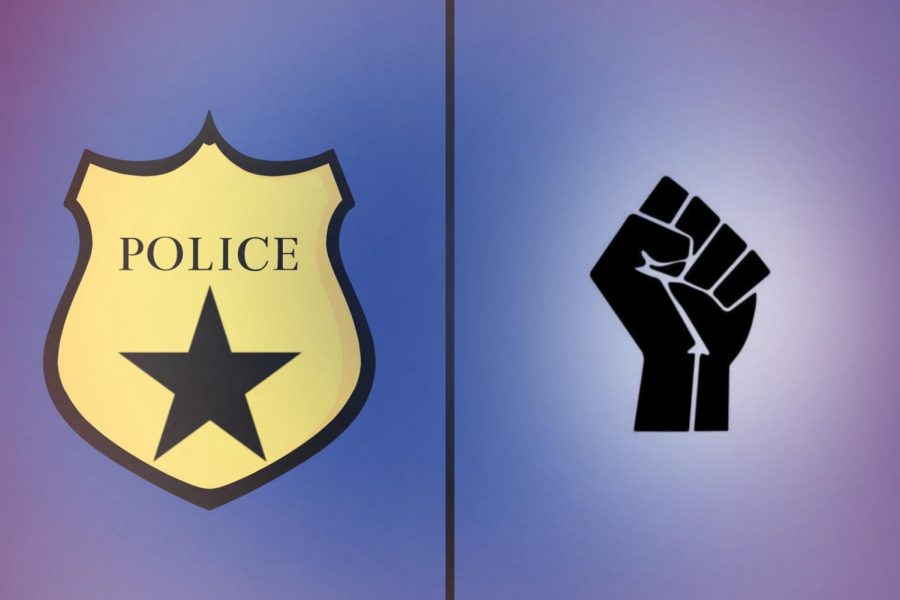Local police look to keep justice ‘just’ in Bradenton
In light of recent events, local police are looking to avoid the mistakes that have led to turmoil in cities across America.
Artwork by staff writer Evanthia Stirou demonstrates the tension between the police and BLM.
We can all agree that 2020 has been a really rough year. A big part of making 2020 such a traumatic grind has been the continuous struggle for justice and equality in our nation. Injustice and inequality have affected people’s lives for centuries and they continue to affect minorities in the United States.
The unjust methods and startling causes leading to the deaths of those such as George Floyd, Breonna Taylor, Elijah McClain, and many more, are not something which our country, as well as our police forces, should take lightly.
The pattern of unjust deaths and questionable methods of policing has paved the way for protests and riots throughout the United States. The Black Lives Matter movement, which was originally started back in 2013, has taken off as a leading organization attempting to seek equality for all under the law. The people are demanding change.
Many believe this change has to start with those who are perpetrating what some see as too many brutal engagements with citizens: the police. On the other side of this argument, many feel the police are being unjustly judged for the actions of just a few “bad cops.”
But either way you look at it, the question is: What do we do to make this better? Defund? Reform? Re-evaluate? These are the big questions in communities across America.
Recent police incidents and the mass spread of videos of those incidents have shed a lot of negative light upon the police in the United States recently. The events have forced people to re-evaluate their beliefs and put their own opinions aside to truly see there is a difference in treatment by police and the courts in the way minorities are subjected to the law.
So, with cities coming under literal fire due to “mistakes” by officers, this poses the question: Could what happened in Minneapolis happen here? What if one of these mistakes or policing mishaps happens in Bradenton? And what is the local police doing to prevent potential race-related issues in the justice system?
Some states have already begun different sorts of reform, such as in California where legislators have introduced a bill to ban chokeholds, and in New York where they changed a law that helped keep officers’ disciplinary records secret. Further, many police departments, including Sarasota, are moving forward with getting body cameras for all officers to increase transparency.
For real change to be made, though, it cannot only be only a policy: it must also be shown and put in place by actions. This is a crucial difference.
In a New York Times article interviewing five experts and organizers, J. Scott Thomson, Police Chief in Camden N.J from 2008-2019 said that “Within a Police Department, culture eats policy for breakfast. You can have a perfectly worded policy, but it’s meaningless if it just exists on paper.”
What communities need is more than just policy change; they need action.
We reached out to the Manatee County Sheriff’s Office to get some answers as to what steps they are taking to prevent potential conflicts in policing.
Manatee County Sheriff Rick Wells is a long-time officer of the law who holds the top spot at the MC Sheriff’s office. He offered some information and insight on what changes are being made and how his department is dealing with this.
According to Wells, the biggest thing the county is implementing the use of body cameras. Wells explained that this is so “people see the full story and not just a 20-second video clip. Body cameras are meant to provide transparency and clarity of questionable situations.
According to the National Institute of Justice, “by 2013, approximately one-third of U.S. municipal police departments had implemented the use of body-worn cameras.”
In terms of the reputation of the police, theoretically, officers of the law should be looked upon and considered as trusted individuals who protect, defend, and help their communities. Unfortunately, due to recent events and media coverage (a whole other topic), this reputation has taken a big turn.
When asked about police reputation and whether the negative connotations connected with police, in his opinion, are justified, Wells said he did not think they were. “There will always be bad apples in any profession but those people who do bad things don’t represent the 99.9% of those that go out and do a great job.” Wells said that an entire profession should not be judged upon the “actions of just a few.”
Sheriff Wells added that it’s easy for people to “sit back and Monday morning quarterback somebody” without truly knowing what that deputy went through. He explained how the world now, more than ever in his 36 years of working, is a more dangerous violent place than before. “Every day an officer wakes up and puts their uniform on not really knowing what to expect. Every day is different,” Wells said.
Implementing policies and keeping them in place is critical to eliminate errors being made and regretful incidents to happen.
If policies aren’t re-inforced enough through training, which is what many see as the major issue, problems are bound to occur. This was seen in 2014 when officers simply stood by while Eric Garner was put in a chokehold and killed by another officer, even though Staten Island, where the misconduct took place, had a policy in place for officers to interfere if they saw another officer use unnecessary amounts of force.
In regards to issues like this, Sheriff Wells said that they are focusing on doing more training and strongly explaining to their deputies the importance of it. He adds that in terms of maintaining rules and regulations “We’re working hard to train our deputies and continue to re-train them.”
But is this training enough? A study in 2016 by the Police Executive Research Forum found that “agencies spend a median of 58 hours on training for recruits on how to use a gun and 49 hours on defensive tactics, but they spend about only eight hours on de-escalation and crisis intervention.”
Injustice towards the black community dates far back into our history and continues to have an effect in 2020. This can’t go on. While there isn’t one straightforward answer to what to do, everyone, including the police department, should reflect upon their actions and consider their tactics going forward. According to Sheriff Wells, Manatee County is doing their best.

Sanna is a senior at Saint Stephen's and is returning to the Gauntlet for her third year. She is serving as an Associate Editor this year. She enjoys listening...

Evanthia is a third-year Creative Director on The Gauntlet. She is a senior here at Saint Stephen's and likes drawing, playing Genshin Impact, and hanging...















































